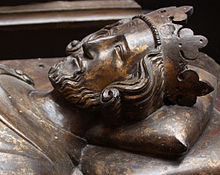Henry III, King of England
| Henry III | |
|---|---|

Effigy of King Henry III in Westminster Abbey, c. 1272
|
|
| King of England (more...) | |
| Reign | 19 October 1216 – 16 November 1272 |
| Coronation | 28 October 1216, Gloucester 17 May 1220, Westminster Abbey |
| Predecessor | John |
| Successor | Edward I |
| Regents |
See
|
| Born |
1 October 1207 Winchester Castle, Hampshire |
| Died | 16 November 1272 (aged 65) Westminster, London |
| Burial | Westminster Abbey, London |
| Consort | Eleanor of Provence |
| Issue |
Edward I of England Margaret, Queen of Scots Beatrice, Countess of Richmond Edmund Crouchback Katherine of England |
| House | Plantagenet |
| Father | John, King of England |
| Mother | Isabella, Countess of Angoulême |
Henry III (1 October 1207 – 16 November 1272), also known as Henry of Winchester, was King of England, Lord of Ireland and Duke of Aquitaine from 1216 until his death. The son of King John and Isabella of Angoulême, Henry assumed the throne when he was only nine in the middle of the First Barons' War. Cardinal Guala declared the war against the rebel barons to be a religious crusade and Henry's forces, led by William Marshal, defeated the rebels at the battles of Lincoln and Sandwich in 1217. Henry promised to abide by the Great Charter of 1225, which limited royal power and protected the rights of the major barons. His early rule was dominated first by Hubert de Burgh and then Peter des Roches, who re-established royal authority after the war. In 1230 the King attempted to reconquer the provinces of France that had once belonged to his father, but the invasion was a debacle. A revolt led by William Marshal's son, Richard, broke out in 1232, ending in a peace settlement negotiated by the Church.
Following the revolt, Henry ruled England personally, rather than governing through senior ministers. He travelled less than previous monarchs, investing heavily in a handful of his favourite palaces and castles. He married Eleanor of Provence, with whom he had five children. Henry was known for his piety, holding lavish religious ceremonies and giving generously to charities; the King was particularly devoted to the figure of Edward the Confessor, whom he adopted as his patron saint. He extracted huge sums of money from the Jews in England, ultimately crippling their ability to do business, and as attitudes towards the Jews hardened, he introduced the Statute of Jewry, attempting to segregate the community. In a fresh attempt to reclaim his family's lands in France, he invaded Poitou in 1242, leading to the disastrous Battle of Taillebourg. After this, Henry relied on diplomacy, cultivating an alliance with Holy Roman Emperor Frederick II. Henry supported his brother Richard in his bid to become King of the Romans in 1256, but was unable to place his own son Edmund on the throne of Sicily, despite investing large amounts of money. He planned to go on crusade to the Levant, but was prevented from doing so by rebellions in Gascony.
...
Wikipedia
